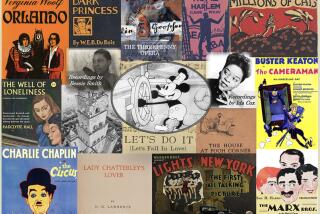Court Limits Scope of Copyright Shield : Communications: Justices rule that directories, or raw facts, may be copied or republished unless they show a degree of creativity.
- Share via
WASHINGTON — The Supreme Court narrowed the reach of copyright protection Wednesday, ruling that directories, computer data bases and other compilations of facts may be copied and republished unless they display “some minimum degree of creativity.”
“Raw facts may be copied at will,” the court said. Moreover, authors and publishers are not protected simply because they have compiled information through the “sweat of the brow.”
Copyright protection depends “on the originality of the selection and arrangement of the factual material, rather than on the industriousness of the efforts to develop the information,” wrote Justice Sandra Day O’Connor for a unanimous court.
Wednesday’s ruling specifically addressed the white pages of the telephone directory, which the court said are not protected by copyright law because they are “devoid of even the slightest trace of creativity.”
But attorneys who are expert in copyright law said that the court’s opinion could have a far broader impact and that it may undercut the fast-growing, $7.5-billion-a-year industry of electronic data publishing.
Many copyright experts have assumed that computer data bases, such as real estate listings, are protected from infringement. Relying on the “sweat-of-the-brow” doctrine, they have contended that those who compiled the data have the sole right to control its use.
Others have maintained that a second firm may take facts from directories or data from computers and republish them for a profit.
Though the Supreme Court opinion does not resolve this dispute in every situation, the justices stressed that the main purpose of the copyright laws is “not to reward the labor of authors but to promote the progress of science and useful arts.”
In addition, the 1976 revisions to the Copyright Act “leave no doubt that originality, not ‘sweat of the brow,’ is the touchstone of copyright protection in directories and other fact-based works,” O’Connor wrote.
“This is a wonderful decision, and it has been long awaited,” said Jeremiah D. McAuliffe of Chicago. He filed a court brief on behalf of the Haines Directories, which use information gleaned from telephone directories.
“This decision clearly says that no matter how hard you work to collect the data, you don’t have a proprietary right to it. If someone presents it in a different way, they don’t violate the copyright laws,” McAuliffe said.
But attorneys representing publishers of computer data reacted cautiously, saying that it will take more litigation to define what is meant by “originality” in the presentation of factual information.
“I think the vast majority of commercially significant data bases are protected by copyright because there is originality involved,” said Steven J. Metalitz, a Washington attorney for the Information Industry Assn.
He conceded, however, that Wednesday’s court ruling described the protection for factual compilations as “thin.”
“I think it does raise a concern. It may require some rethinking by the industry,” he said.
He and other attorneys said that the court opinion does not settle the question of whether a publisher or a computer firm could select some information from another firm’s original data, repackage it and republish it. But O’Connor’s opinion seems to suggest that such repackaging would be legal.
“Copyright is not a tool by which a compilation author may keep others from using the facts or data he or she has collected. Rather, the facts contained in existing works may be freely copied because copyright protects only the elements that owe their origin to the compiler--the selection, coordination and arrangements of facts,” she wrote.
“No matter how original the format, however, the facts themselves do not become original through association,” she added.
The case before the court arose when the Rural Telephone Service, a small Kansas utility, filed a copyright infringement suit against an independent publisher, Feist Publications, that reprinted listings from its white pages.
A federal judge in Kansas said that Feist had violated copyright protection and the federal appeals court in Denver agreed.
The high court reversed those rulings in the case (Feist Publications Inc. vs. Rural Telephone Service, 89-1909). The white pages, O’Connor said, clearly do “not possess the minimal creative spark” required to gain copyright protection.
More to Read
Inside the business of entertainment
The Wide Shot brings you news, analysis and insights on everything from streaming wars to production — and what it all means for the future.
You may occasionally receive promotional content from the Los Angeles Times.











